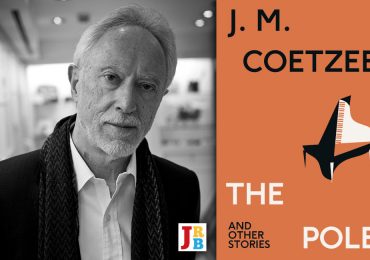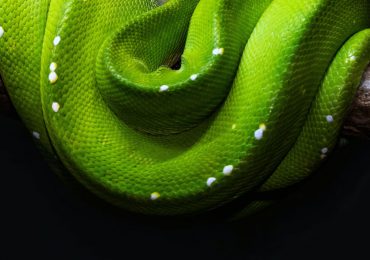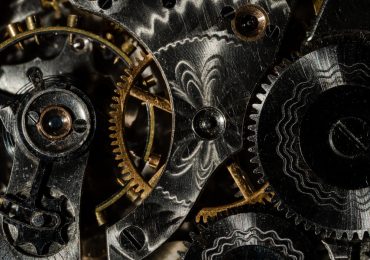Exclusive to The JRB, new short fiction from SJ Naudé.
~~~
Some Men
Jakob leaves the gift on the roof of the car. He walks around the vehicle, crouches to touch the lacerations where each of the tyres has been slashed. He looks up at the blind windows of the council flats across the street. As a Swede he can only shake his head at British class resentment and envy. His car is a two-door convertible, yes, but it’s a decade old.
He takes out his cellphone, calls Eric. He is sorry, he’s going to have to miss Christmas Eve in Islington. The tube from London Bridge Station is suspended until Boxing Day. And it’s unlikely that he’ll find a taxi at this hour, on this day, in this weather. Eric sounds dejected. He and his husband Simon thought that Jakob could do with some company today. And they wanted him to meet their six-year-old boy Ben, whom they adopted recently after a five year process. Jakob reckons the invitation was in fact aimed at his own seven-year-old twin daughters, who will no longer be going.
Jakob could probably cycle to Eric and Mark’s. But icicles are hanging from his bicycle out on the balcony. And the sky is greenish; it might snow. To be honest, he is relieved to have a solitary afternoon and evening ahead of him. He takes the gift, walks back to the flat. In the park opposite, feral adolescents are loitering—the ones who sometimes sweep through the streets and intimidate the homeless. Jakob imagines knives in children’s hands, blades gleaming blue in the winter light.
It is as cold inside as out. The central heating broke down this morning. No-one could send out a heating engineer until after Christmas. In vain he fiddled with the appliance, pushing his fingers into the electronic innards, trying to reignite the pilot light. A tiny electrical heater is now exhaling lukewarm air, which makes hardly any difference. He leaves the gift (it was for the six-year-old) on the dining table. Jakob has no idea what it is. His wife bought it a week ago, had it wrapped in the shop.
Three days ago she left Jakob. It caught him unawares. Yes, they had had their problems: they would argue about how asocial he was, their lack of mutual friends, his distant relationship with the twins. His work for a City investment firm consumes him. He doesn’t derive any satisfaction from it; on the contrary, it makes him miserable. But it’s a refuge. When he walks into his office, his thoughts fall into place and life becomes predictable.
When he first met his wife, she was an opera student. He saw her on stage, in a student production. She is Icelandic, half-Inuit. Her skin is rubbery and smooth like that of a seal. After they married and moved to London, she stopped singing. When she wasn’t busy with her daughters, she would spend hours with her Icelandic and British friends. All generators of sound, of noise: composers and music producers, classical music and avant garde pop types.
Jakob leaves the heater’s small circle of comfort, folds a blanket around his shoulders, enters the twins’ room. His wife took them along to her mother’s house in Iceland. Can he really say his wife has left him? She did, after all, only say that she didn’t want him to join them now. She would call him later to talk about the future (she hasn’t yet). He opens the closets: almost empty. Who packs summer clothes for a Christmas visit?
The fridge is almost empty too. Jakob puts on his coat again, leaves the flat, walks towards London Bridge. He has to find something to eat. It is half past three, almost dark now, insofar as London ever gets really dark. While he is walking, he thinks of his mother-in-law’s home, where his wife and daughters are, an hour’s drive from Reykjavik: the modest farmhouse with its low ceilings, the burning hearth, the smell of smoke and a cake in the oven blending with that of ponies in the lean-to stable at the back …
He enters an overlit convenience store and buys two pallid pies to heat up in the microwave at home. When he exits, he turns south, starts walking back along Borough High Street. A figure in a recess by the pavement draws his attention. The man says something. Jakob stops in his tracks. ‘Some men …’ is all he hears.
Jakob approaches. A boy—young man—of nineteen or twenty, is sitting there, on the bare concrete. His pullover is thin, the sleeves pulled down over his hands, his eyes cast down. ‘What about some men?’ Jakob asks.
‘Some men,’ he starts again, ‘like bats or owls, have better eyes for the darkness than the light.’ He has a strong Irish accent. He is looking Jakob straight in the eye now. His hair is crow black, his skin transparent, illuminated from the inside. He is freckled, with the ears and cheekbones of an elf.
Jakob doesn’t say anything. He takes out a ten pound note, holds it out. The young man swiftly takes it, puts it inside his trousers. For a few moments, they just look at each other. The man’s gaze settles on the shopping bag. Jakob takes out both pies, gently puts them in the man’s lap. He walks on, his heart oddly turbulent.
Back home, he sits down amid the silence. The useless little heater remains switched off. The young Irishman’s words did not sound like his own; Jakob googles it on his cellphone. And, yes, there it is: Dickens, from The Pickwick Papers. The quoted line is preceded by: There are dark shadows on the earth, but its lights are stronger in the contrast. And followed by: We, who have no such optical powers, are better pleased to take our last parting look at the visionary companions of many solitary hours, when the brief sunshine of the world is blazing full upon them.
Jakob is still wearing his coat. He goes and rummages around in a closet, finds an oversized old cardigan. He picks up the gift from the dining room table, rushes down the stairs, out into the street. He hastens back to Borough High Street. When he is a few hundred yards from where the young man is sitting, he sees him getting up and walking away. Has he seen Jakob approach? He disappears around a corner. When Jakob turns the corner, the young man is gone. Jakob walks on, alert to cracks and openings, peering into alleys. He half expects the gleaming of a blade somewhere in the dusk, but nothing stirs. At last he enters London Bridge Station’s bright departure hall. The light makes his eyes ache; he scours the cavernous, almost empty space.
Then he sees the thin figure outside, at the top of the stairs leading down to street level. The man’s gaze meets Jakob’s; he disappears down the stairs. Jakob follows, also descends the twilight stairs. He veers right, following the figure. The young man stops at a door, looks back at Jakob again, goes inside.
Jakob enters the door, encountering a little table with an empty chair, underneath a sign saying The Old Operating Theatre Museum. There is a spiral staircase, the helix of which he now ascends. At the top there is a door, which he enters. There, in the middle of the well-lit old theatre, on an operating table, sits the dark figure.
‘Hi,’ says Jakob. He doesn’t approach the young man; instead he walks up a few stairs to one of the observers’ benches arranged in a small amphitheatre around the operating table. The wooden bench creaks when he sits down like a student waiting for the master surgeon to start cutting.
‘I’m from Ireland.’
‘So I’ve noticed.’ Jakob waits a few moments, then asks: ‘What’s your name?’
He hesitates. ‘Cian.’
Jakob looks straight at Cian. ‘How do you end up on the streets of London?’
Cian looks back at Jakob in a manner that simultaneously chills and excites him. For a long while neither of them says anything. Cian looks away, starts telling. A story about a farm in County Wexford, where he grew up. About how he and the neighbours’ son Quinlan were childhood friends. How they later became more than friends. How Quinlan’s father threw him out after he caught them in the barn. How Quinlan left for London, and got into trouble here. ‘Quinlan is the only person in the world who gives a fuck about me …’
For a while they sit in silence.
‘I could take you home,’ Jakob says, ‘but it’s as cold there as it is here. And I don’t have an operating table.’ What the operating table has to do with anything, Jakob doesn’t know.
Silence again.
‘Why do you tell me your story so easily?’ Jakob wants to know.
‘I want to keep you here.’
‘Why?’
Cian breathes deeply. ‘I have to make my way to jail. To Quinlan. So that we can be together again. That’s why I’m in London.’
Jakob frowns, clears his throat. ‘I brought you this cardigan. That’s why I came back.’ He holds up the garment, which now looks old-fashioned, faintly ridiculous. Just then the lights go off. Jakob hears the door to the street downstairs being closed, then locked. Pale light shines through a skylight. His eyes have to adjust to the dark. Neither of them moves.
Cian ignores the offer of the cardigan. Jakob can hear in Cian’s voice how cold he is, how he is shivering.
‘You know I have to do something to you, don’t you?’
Jakob looks into Cian’s black eyes. ‘Do something to me?’
He nods. ‘It’s the only way to get to Quinlan. To join him in jail.’
‘Ah,’ Jakob says and slowly nods his head. ‘I’m starting to understand.’ He hesitates. ‘But how do you know you’ll end up in the same jail as he?’
‘This is where he did it. This very place.’ He gestures towards the room around them. ‘Knifed a man, took his wallet. I’ll go to the same court, the same jail.’
Jakob looks up at the skylight. He imagines himself falling, from high above, towards the shimmering city, waiting down below like a new year. But then the black fog moves in, obscuring the lights, swathing him in Christmas gloom.
‘Why don’t you rather steal something somewhere? Burgle some place?’
‘Quinlan is in for years; I have to do something serious. Stealing won’t help.’
‘And why me?’
‘That business about “bats or owls”, about “eyes for the darkness”—that’s the test. Those words choose the right one. That’s what Quinlan taught me.’ Cian’s voice echoes in the dim little theatre. Jakob is wondering whether Quinlan actually exists.
‘I don’t believe you wish to do me harm. I don’t see that in you.’
Cian slips off the operating table. As he approaches Jakob, his hand moves into his trouser pocket. Jakob’s breathing slows down; he feels as calm as a grey lake. He opens his coat collar, exposing his chest. Cian takes his hand from his pocket. From his fist a tiny flame leaps up—a cigarette lighter. He reaches past Jakob—past the cardigan—to the gift, tears off the wrapping in a single movement. They look at it together in the pale glow of the flame. Dickens, once more: A Christmas Carol. A storybook for the six-year-old child who will tonight be nestling safely between his new fathers in their warm Islington bed.
Jakob reaches for the cardigan. It is large enough, he thinks, to fit around both his and Cian’s shoulders: before long, they will doze off, snugly pressed together like Siamese twins. And when the first light starts filtering through the skylight, Jakob will turn to the blurry shape next to him with a sleepy smile and say: ‘Merry Christmas.’
- SJ Naudé is the author of The Alphabet of Birds, a collection of short stories published in Afrikaans, English and Dutch and a new novel, The Third Reel. He studied at Cambridge University and Columbia Law School. He has, inter alia, won the University of Johannesburg Debut Prize and the Jan Rabie Rapport Prize, and was awarded the Jan Rabie and Marjorie Wallace Writing Scholarship for 2014. His work has appeared in Granta and journals in the United States, the Netherlands and Italy. Having worked as a lawyer in New York and London for many years, he currently lives in Johannesburg.
© SJ Naudé, 2017





